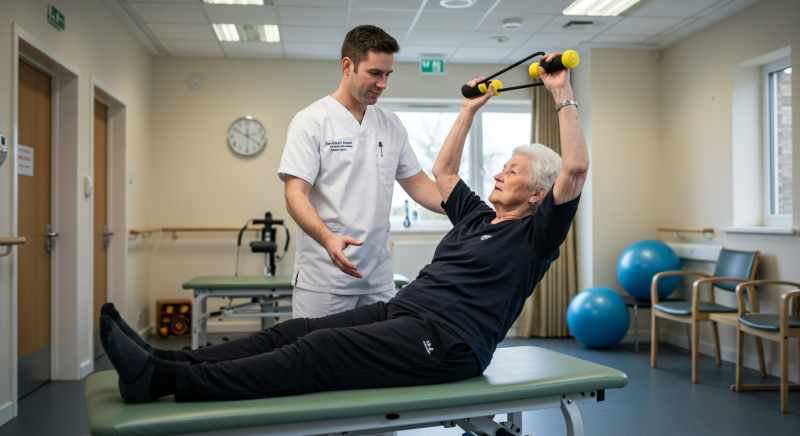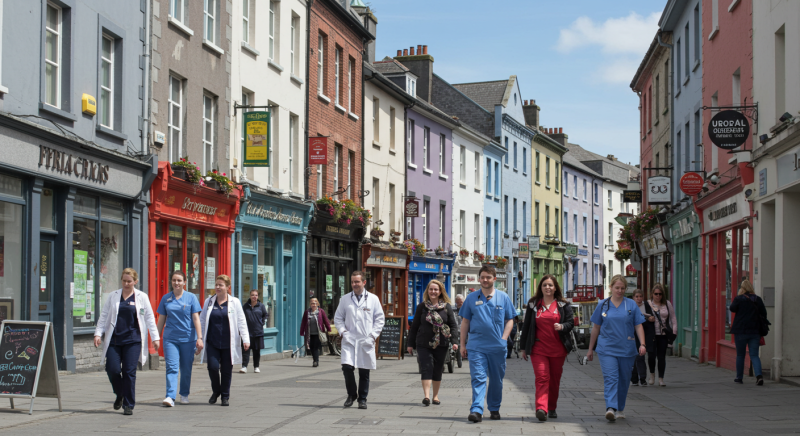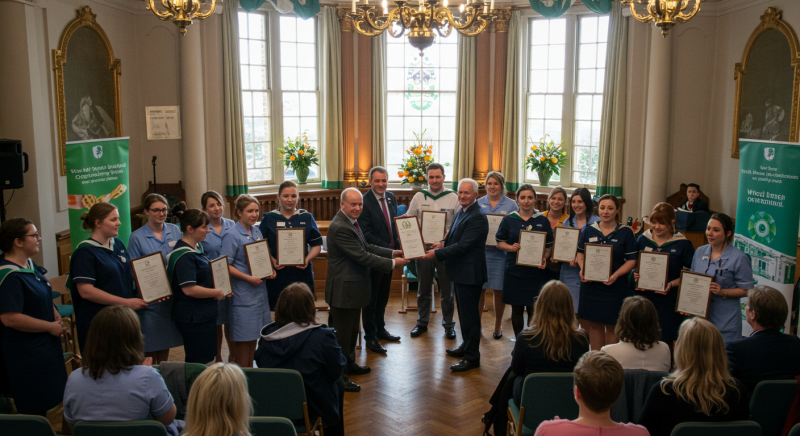The Dream That Changed Everything
You’re a dedicated nurse working endless shifts in Lagos, watching your salary barely cover the basics while your skills and passion for healthcare remain undervalued. Then you discover Ireland’s healthcare system is actively seeking talented professionals like you, offering not just competitive salaries but a clear path to permanent residency. This isn’t just another immigration story – it’s your potential reality through the Ireland healthcare worker visa program.
Ireland’s healthcare sector is facing a critical shortage of qualified professionals, and the government has responded by creating streamlined immigration pathways specifically for healthcare workers. The Ireland healthcare worker visa through the Critical Skills Employment Permit represents one of the most accessible routes for qualified nurses, caregivers, and physiotherapists to build new lives in Europe.
Key Takeaways
Before diving into the complete guide, here are the essential points you need to understand about securing your Ireland healthcare worker visa:
- Healthcare professionals are among the most sought-after workers in Ireland’s immigration system
- The Critical Skills Employment Permit offers a fast-track to permanent residency within 21 months
- Salary thresholds for healthcare workers start from €34,000 annually for General Employment Permits
- Nigerian healthcare professionals have successfully secured thousands of visas through this program
- The application process typically takes 6-8 weeks once your employer submits the permit application
- You can switch employers after 9 months without reapplying for a new permit

Understanding Ireland’s Healthcare Worker Shortage
Ireland’s healthcare system is experiencing unprecedented demand for qualified professionals. The number of practicing physiotherapists in Ireland for 2023 stood at 5,926 physiotherapists, an increase of 5.6% from the previous year, yet this growth still falls short of meeting the country’s healthcare demands. The situation is even more critical for nursing professionals, where Ireland had 1,288 professionally active nursing professionals (including also midwives) per 100,000 inhabitants in 2018, creating substantial opportunities for international healthcare workers.
The Irish government has recognized this shortage and actively encourages healthcare professionals from countries like Nigeria to fill these gaps. This demand translates into real opportunities for nurses, caregivers, and physiotherapists seeking to immigrate through the Ireland healthcare worker visa system.
What is the Critical Skills Employment Permit?
The Critical Skills Employment Permit serves as the primary pathway for your Ireland healthcare worker visa application. The Critical Skills Employment Permit replaces the Green Card type employment permit. The Critical Skills Employment Permit is designed to attract highly skilled people into the labour market with the aim of encouraging them to take up permanent residence in the State.
This permit offers several advantages over standard work visas. Healthcare professionals who secure their Ireland healthcare worker visa through this route can expect a streamlined application process, reduced waiting times, and most importantly, eligibility for permanent residency after just 21 months of residence in Ireland.
The permit also provides flexibility that many other immigration programs lack. From 2 September 2024, you can be promoted or move internally within the same company if you will be using the same skills, and the job is still eligible. If you qualify for a Stamp 4 after 21 months, you can change jobs without needing to apply for an employment permit.
Who Qualifies for the Ireland Healthcare Worker Visa?
The Ireland healthcare worker visa program targets specific healthcare professions experiencing acute shortages. Your eligibility depends on your professional qualifications, experience, and the specific role you’re applying for.
Nurses and Midwives
Registered nurses represent the largest group of healthcare professionals immigrating to Ireland. To qualify for your Ireland healthcare worker visa as a nurse, you need:
- Valid nursing registration in your home country
- Minimum of two years post-qualification experience
- English language proficiency (usually IELTS 7.0 overall with no band below 6.5)
- Willingness to register with the Nursing and Midwifery Board of Ireland (NMBI)
Physiotherapists
The demand for physiotherapists continues growing as Ireland’s population ages. The growing numbers reflect this trend, with steady increases year over year. For your Ireland healthcare worker visa as a physiotherapist, you need:
- Recognized physiotherapy degree from an accredited institution
- Professional registration in your home country
- Relevant clinical experience
- English language proficiency
Caregivers and Care Assistants
While traditional caregiving roles may not qualify for the Critical Skills permit, specialized care positions in areas like mental health, elderly care, and disability support often do. Your Ireland healthcare worker visa application as a caregiver requires:
- Relevant qualifications in care work or related field
- Demonstrated experience in specialized care environments
- Understanding of Irish care standards and regulations
Step-by-Step Application Process
Securing your Ireland healthcare worker visa involves a systematic approach that begins before you even apply. Understanding each step helps you prepare thoroughly and avoid common pitfalls that delay applications.
Step 1: Secure a Job Offer
Your journey to obtaining an Ireland healthcare worker visa begins with securing employment from an Irish healthcare employer. This isn’t just any job offer – it must be from a registered employer who can demonstrate they cannot fill the position with an Irish or EU worker.
Research Irish healthcare facilities actively recruiting international staff. Many hospitals, nursing homes, and private healthcare providers regularly attend international recruitment fairs or work with specialized recruitment agencies. The job offer must meet minimum salary requirements and match your qualifications.
Step 2: Employer Applies for Labour Market Test
Once you have a job offer, your employer must conduct a Labour Market Test to prove they cannot fill the position locally. However, many healthcare positions are exempt from this requirement due to skills shortages. Your employer will know whether your specific Ireland healthcare worker visa application requires this step.
Step 3: Employment Permit Application
Your employer submits the employment permit application on your behalf. The application fee for a work visa in Ireland varies based on the visa type, its validity period, and the applicant’s nationality. For instance, a Critical Skills Employment Permit (CSEP) costs €1,000, whereas a General Employment Permit is €60 for a single-entry visa.
The application includes your educational credentials, work experience documentation, and proof that you meet the salary requirements. Processing typically takes 6-8 weeks, though healthcare applications often receive priority processing.
Step 4: Professional Registration
While your employment permit processes, begin your professional registration with the relevant Irish regulatory body. For nurses, this means applying to the Nursing and Midwifery Board of Ireland (NMBI). Physiotherapists must register with CORU, the Health and Social Care Professionals Council.
This step often takes several months, so starting early ensures you can begin working immediately upon arrival. The registration process includes credential verification, English language testing, and sometimes additional training requirements.
Step 5: Visa Application
Once your employment permit is approved, you can apply for your entry visa to Ireland. This step involves submitting your passport, permit approval, and supporting documents to the Irish embassy or consulate in Nigeria. Processing typically takes 2-3 weeks.
Step 6: Arrival and Immigration Registration
Upon arriving in Ireland with your Ireland healthcare worker visa, you must register with immigration authorities within 90 days. This registration provides you with an Irish Residence Permit (IRP) and confirms your legal status in the country.
Salary Requirements and Financial Considerations
Understanding the financial aspects of your Ireland healthcare worker visa helps you make informed decisions about your move. The Irish government has established minimum salary thresholds that employers must meet when hiring international healthcare workers.
From January 2024, the salary threshold for General Employment Permits increased from €30,000 to €34,000 per annum, and for Critical Skills Employment Permits with a degree, it rose from €32,000 to €38,000 per annum. These increases reflect Ireland’s commitment to ensuring international workers receive fair compensation.
For healthcare professionals, salaries typically exceed these minimums significantly. Newly qualified nurses can expect starting salaries between €35,000-€40,000 annually, while experienced nurses earn €45,000-€55,000 or more. Physiotherapists often command higher salaries, ranging from €40,000-€60,000 depending on specialization and experience.
Beyond base salaries, consider additional benefits commonly offered to healthcare workers in Ireland. These include pension contributions, professional development allowances, shift differentials for night and weekend work, and comprehensive health insurance coverage.
The cost of living in Ireland varies significantly by location. Dublin, while offering the highest salaries, also has the highest living costs. Consider smaller cities like Cork, Galway, or Limerick, which offer lower living costs while maintaining good healthcare facilities and cultural amenities.
Professional Recognition and Career Development
Your Ireland healthcare worker visa opens doors to professional recognition and career advancement opportunities that may not exist in your home country. The Irish healthcare system values international experience and provides structured pathways for career progression.
Nursing Career Progression
The Irish nursing system offers multiple specialty areas and advancement opportunities. After gaining Irish experience, you can pursue specialized training in areas like intensive care, emergency nursing, or nurse management. Many international nurses progress to senior roles within 3-5 years of arrival.
The Health Service Executive (HSE), Ireland’s public health service, offers extensive continuing education programs for nurses. These programs are often fully funded and can lead to higher qualifications and salary increases.
Physiotherapy Specialization
Physiotherapists in Ireland can specialize in numerous areas including sports therapy, neurological rehabilitation, and pediatric physiotherapy. The Irish Society of Chartered Physiotherapists provides ongoing professional development opportunities and maintains high standards of practice.
Many physiotherapists establish private practices alongside their employed positions, creating additional income streams and professional autonomy.

Common Challenges and Solutions
Pursuing your Ireland healthcare worker visa presents certain challenges that prepared applicants can navigate successfully. Understanding these challenges and their solutions helps ensure your application succeeds.
Challenge 1: Professional Registration Delays
Professional registration often takes longer than expected, particularly for nurses registering with NMBI. The process involves credential verification, English language testing, and sometimes additional assessments.
Solution: Start your registration process immediately upon deciding to pursue your Ireland healthcare worker visa. Don’t wait for job offers or permit approvals. Early application allows time for any additional requirements or documentation requests.
Challenge 2: English Language Requirements
Many healthcare professionals struggle with English language testing requirements, particularly the academic components of IELTS.
Solution: Invest in quality English language preparation, focusing specifically on medical English terminology. Consider online courses designed for healthcare professionals preparing for international practice. Practice the IELTS exam format extensively before taking the test.
Challenge 3: Cultural Adaptation
The Irish healthcare system operates differently from systems in Nigeria, requiring adaptation to new protocols, technologies, and patient care approaches.
Solution: Research Irish healthcare standards and practices before arrival. Many Irish healthcare facilities offer orientation programs for international staff. Connect with other Nigerian healthcare professionals working in Ireland through social media groups and professional networks.
Life in Ireland for Healthcare Workers
Your Ireland healthcare worker visa provides access to one of Europe’s most welcoming societies. Ireland offers an excellent quality of life, strong worker protections, and a culture that values work-life balance.
Healthcare System Benefits
Working within the Irish healthcare system provides job security and comprehensive benefits. Most healthcare positions include generous annual leave, sick leave, and professional development time. The system emphasizes evidence-based practice and continuous improvement, creating intellectually stimulating work environments.
Community and Support Networks
Ireland hosts significant communities of Nigerian and other African healthcare professionals. These communities provide practical support, cultural connections, and professional networking opportunities. Many cities have Nigerian churches, cultural organizations, and social groups that help newcomers integrate successfully.
Family Considerations
Your Ireland healthcare worker visa allows you to bring dependents, including spouses and children under 18. Spouses can apply for dependent permits that allow them to work in Ireland, though they may need separate work permits depending on their profession.
Ireland’s education system is excellent, with free primary and secondary education for all residents. Universities offer numerous programs and international students pay reduced fees after establishing residency.
Pathway to Permanent Residency
The Critical Skills Employment Permit provides one of the fastest routes to permanent residency in Europe. You can choose to change your job. As of September 2024, you are not required to make a new application for a Critical Skills and Employment Permit. However, you can only change jobs in the same field. For example, if you are an engineer, you can only apply for different engineering jobs.
After 21 months of residence, Critical Skills permit holders become eligible for Stamp 4 permission, which provides almost all the rights of Irish citizens except voting. This status allows you to work for any employer, start a business, and apply for Irish citizenship after five years of residence.
The pathway to permanent residency through your Ireland healthcare worker visa is straightforward and well-established. Thousands of healthcare professionals have successfully obtained permanent residency and citizenship through this route.
Recent Updates and Future Outlook
Ireland continues expanding opportunities for international healthcare workers. Recent policy changes have made the Ireland healthcare worker visa process more accessible and attractive to qualified professionals.
In 2024, the employer switching period was reduced to 9 months, and new roles like sustainability specialists were added to the Critical Skills Occupations List. These changes reflect Ireland’s commitment to attracting and retaining international talent in critical sectors.
The healthcare sector outlook remains extremely positive for international workers. An aging population, increasing healthcare demand, and ongoing staff shortages ensure continued opportunities for qualified professionals seeking their Ireland healthcare worker visa.
Government projections indicate that demand for healthcare workers will continue growing through 2030 and beyond. This sustained demand provides job security and career advancement opportunities for professionals who successfully immigrate through the Ireland healthcare worker visa program.

Conclusion
Your journey to securing an Ireland healthcare worker visa represents more than just a career change – it’s a pathway to a new life filled with professional opportunities, personal growth, and financial security. The Critical Skills Employment Permit system provides a clear, achievable route for qualified nurses, caregivers, and physiotherapists to build successful careers in one of Europe’s most dynamic healthcare systems.
The process requires dedication, patience, and careful preparation, but thousands of Nigerian healthcare professionals have successfully navigated this path. With proper planning, professional qualifications, and determination, your Ireland healthcare worker visa can become the key to unlocking opportunities you never imagined possible.
Take the first step today by researching Irish healthcare employers, beginning your professional registration process, and preparing for the English language requirements. Your new life in Ireland awaits, and the healthcare system needs your skills and dedication.
Frequently Asked Questions
Q: How long does the Ireland healthcare worker visa process take? A: The complete process typically takes 6-12 months from initial job application to arrival in Ireland. Employment permit processing takes 6-8 weeks, while professional registration can take 3-6 months depending on your profession.
Q: Can I bring my family with my Ireland healthcare worker visa? A: Yes, the Critical Skills Employment Permit allows you to bring your spouse and dependent children under 18. Your spouse can apply for a dependent permit that may allow them to work in Ireland.
Q: What are the English language requirements for healthcare workers? A: Most healthcare positions require IELTS 7.0 overall with no band below 6.5. Some regulatory bodies may have specific requirements, so check with the relevant professional body for your field.
Q: Can I switch employers after getting my Ireland healthcare worker visa? A: Yes, after 9 months you can switch employers within the same field without reapplying for a new permit. After 21 months, you may be eligible for Stamp 4 status, which allows you to work for any employer.
Q: What is the average salary for healthcare workers in Ireland? A: Salaries vary by role and experience. Newly qualified nurses earn €35,000-€40,000 annually, while experienced nurses can earn €45,000-€55,000+. Physiotherapists typically earn €40,000-€60,000 depending on specialization.
Q: Is professional registration required for all healthcare workers? A: Yes, most healthcare professionals must register with the relevant regulatory body. Nurses register with NMBI, physiotherapists with CORU, and other professionals with their respective bodies.
Q: What are the main challenges facing healthcare workers immigrating to Ireland? A: Common challenges include professional registration delays, English language requirements, and cultural adaptation. However, these challenges are manageable with proper preparation and support.
Q: How quickly can I apply for permanent residency? A: Critical Skills Employment Permit holders can apply for Stamp 4 status after 21 months of residence, which provides a pathway to permanent residency and eventual citizenship.
Q: Are there opportunities for career advancement in Ireland’s healthcare system? A: Yes, Ireland offers excellent opportunities for professional development and career advancement. The system supports continuing education, specialization, and leadership development for healthcare professionals.
Q: What should I do if my Ireland healthcare worker visa application is rejected? A: If your application is rejected, review the reasons provided and address any deficiencies. You can reapply once you’ve corrected the issues. Consider consulting with an immigration lawyer for complex cases.
Read more US Work Visa: Everything You Need to Successfully Apply
External Source Links Integrated:
